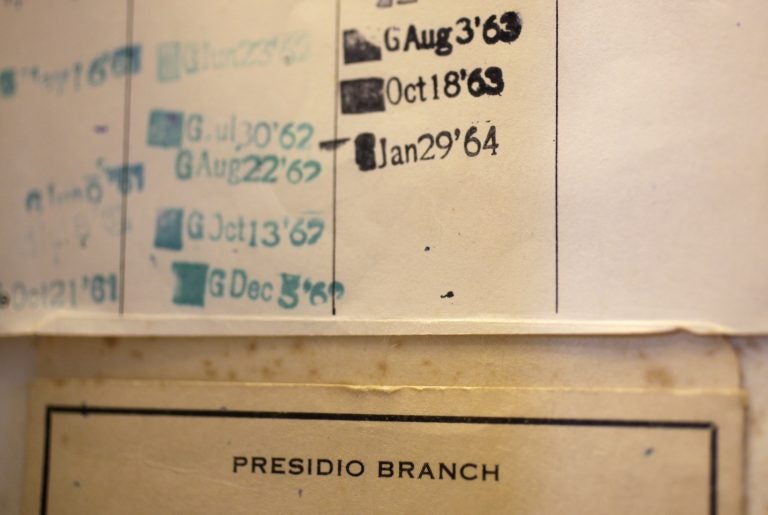Advocate for nixing library book late fees gives her take on what’s becoming a national trend
Wisconsin librarian Dawn Wacek says waiving late fees helped bring people back to her library. Philadelphia’s libraries are considering doing the same.
Listen 5:39
This June 17, 2009 photo shows a return date of January 29, 1964 stamped inside a copy of George Bernard Shaw's 'Man and Superman' displayed at the San Francisco Public Library in San Francisco that was returned after 45 years. In all, 29,000 overdue items were returned during the May amnesty program, library officials reported. That amounted to about $730,000 and included more than 3,100 books that were more than 60 days late and had been considered gone forever. (Eric Risberg/AP Photo)
There’s a public debate about whether library book late fees are necessary. Some cities, including Chicago, Phoenix and Dallas have eliminated these fines because the prospect of a late fee can deter use of library services.
Dawn Wacek is the youth services manager at the La Crosse Public Library in Wisconsin which went fine-free in 2018.
Next month, the Board of Trustees of the Free Library of Philadelphia will consider eliminating late fees for overdue books.
Morning Edition host Jennifer Lynn contacted Wacek to get her advice.
—
Dawn Wacek: A colleague of mine took a ride in a Lyft in Atlanta last year, and he started chatting with his driver about libraries, as we do. She told him she grew up visiting her local library. She loved it. But now that she’s a parent with three children of her own, there’s no way she would allow them to get a library card because of the strict deadlines libraries impose. She said it would be like another credit card that I can’t pay. When libraries have experimented with eliminating children’s fines, they had a 126% increase in child card applications within the first few months. When people aren’t afraid of the fines they might accrue, they line up to access what we have to offer.
You know, we see children all the time from all walks of life. The library is for everybody. We want to make sure that all of the children are really succeeding.
Now, what happens if there are no fines and fees? How do you get your materials back? Isn’t that the number one thing? It was a way to motivate people to bring everything back so you can share the materials throughout the community.
That is what people say it’s for. When we’ve done some studies, we found that those who have the means simply pay the fine and keep the book as long as they’re going to. If they’re a person who is very on top of their organization and their home life, then their books come back right on time every time. And if they’re not, then they either pay the fine or they stop coming back. So when we reduce fines or eliminate fines, there’s some variation library to library. But for the most part, libraries are finding that their materials are coming back right on time or the same amount of lateness as previously.
What about budgeting? I’ve heard that fines amount to about 1% of a budget, but it depends if you have a big library or a little library what that 1% might look like.
Yes, our library, that 1% is maybe $70,000. That’s arguably a salary of a staff member. So much of our staff time was going to collecting fines, whether it was materials we were mailing out or phone calls we were making or conversations at the desk, when what we really wanted our staff to be doing was spending time building relationships and connecting people to resources. When we accounted for that staff time, we found that that dollar amount was negligible.
I don’t think it’s up to the librarians to teach responsibility, but it always seemed like that basic lesson, if you start with your library card as a kid, is “if you borrow something, you have to bring it back.” Are we no longer teaching people responsibility in that basic way if we wipe out the fine?
If they don’t bring it back, they don’t get to check out more and they always want to check out more, right? They want to be able to get the newest DVD or the newest series books or whatever it is that they’re interested in. So we say, “Bring back your materials and you can check out as much as you want. If you’re a few days late, that’s not something you need to worry about or be concerned about. Just bring it back.” We found that people were returning things that they had had for years because they didn’t want to face the librarian. They were concerned about that.
You really want a library to be a place for everybody. That’s really the bottom line.
It is. For us, especially working with children, I want every single family that walks in our door to feel like this is their library. If they don’t feel that way and don’t come in, or they tell their children they can’t get a library card because of fears of fines, that’s not making it for everybody.
You’ve heard stories of adults who say, “I don’t even want to be bothered for the library card because I fear fines.”
Yes. We’ve heard it from our teachers in our school district. Children that they know well, when they ask them, “Have you been to the public library?” They say, “Oh, no, my parents won’t let me get a card because there’s money involved.” We’ve known that was a problem for the past few years and it was something that was important to us to solve.
You often site something called a word gap. This notion that kids can be exposed to more or less language, words, across socioeconomic circumstances. You’ve said libraries can serve kids in ways to reduce that gap.
Yeah. I think it’s a complex problem and libraries certainly aren’t the only solution. But reading aloud to children, having access to books, knowing that you can read and hear words in your home that you might not generally use in conversation is really valuable for families.
And you guys have survived this change?
We have! We’re a little over a year in and we have the same number of staff. We haven’t lost anybody over it, we have our materials coming in and we’ve had numerous people tell us how important it is to them that we got rid of fines. They feel comfortable coming in again.
WHYY is your source for fact-based, in-depth journalism and information. As a nonprofit organization, we rely on financial support from readers like you. Please give today.





